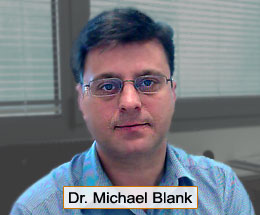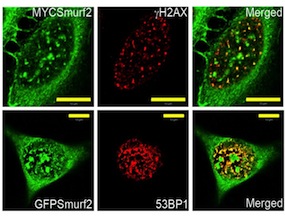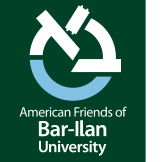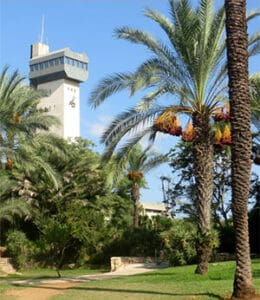Safed, Israel -
When Dr. Michael Blank was seven years old, his father succumbed to cancer, creating a void that became “the main driver in my life,” he says. His father’s death set him on a career path to be part of a research team that discovered a tumor suppressor gene called Smurf2, and now pursue his quest to understand the origin of cancer cells as the assistant professor and senior lecturer on the Bar-Ilan University (BIU) Medical School in Safed.
 Well aware that, for most people, the name of this anticancer molecule called Smurf 2 conjures up an image of tiny, blue fictional creatures, Dr. Blank says with a chuckle, “Smurf2 stands for smad ubiquitin regulatory factor two … It is a gene that inhibits the transformation of normal cells to cancer cells.”
Well aware that, for most people, the name of this anticancer molecule called Smurf 2 conjures up an image of tiny, blue fictional creatures, Dr. Blank says with a chuckle, “Smurf2 stands for smad ubiquitin regulatory factor two … It is a gene that inhibits the transformation of normal cells to cancer cells.”
Dr. Blank returned to Israel from the US two and a half years ago after five years as a visiting postdoctoral fellow at the National Cancer Institute of the National Institutes of Health (NIH). At Bar-Ilan, his research will focus on continuing to study the Smurf2 gene that he and his teammates discovered while he was at the NIH. Specifically, he is interested in the molecular mechanisms that regulate cell growth and lead to the formation of tumors.
 Interestingly, scientists already knew about Smurf2 and most of its biological functions in cells. But, Dr. Blank discovered that the gene also acts as a powerful tumor suppressor that, when activated, clears the way for a spectrum of tumors to develop. “We ‘knocked out’ the Smurf2 gene in one group of mice and compared it to another group with regular genes. We found that different types of tumors began to grow in the organs and tissues of the first group. Some mice developed lymphomas, others mammary tumors, still others lung or liver cancers,” he says.
Interestingly, scientists already knew about Smurf2 and most of its biological functions in cells. But, Dr. Blank discovered that the gene also acts as a powerful tumor suppressor that, when activated, clears the way for a spectrum of tumors to develop. “We ‘knocked out’ the Smurf2 gene in one group of mice and compared it to another group with regular genes. We found that different types of tumors began to grow in the organs and tissues of the first group. Some mice developed lymphomas, others mammary tumors, still others lung or liver cancers,” he says.
This significant discovery was featured in a cover story by the prestigious biomedical journal Nature Medicine. It was also highlighted in other respected biomedical journals and earned Dr. Blank the NIH Fellows Award for Research Excellence in 2010.
Born in Ukraine, Dr. Blank began studying toward an MD degree at Donetsk State Medical University. In 1995, he decided to complete his medical studies in Israel because it “had a high level of education and research facilities.” At age 25, he made aliyah and came to Israel alone. He completed his studies at the Sackler School of Medicine at Tel-Aviv University.
Dr. Blank said he “loves” living in Karmiel with his wife and two children, saying, “Israel is a great place to raise kids, even despite the instability in the region.” On a sober note, he adds,” We just hope for peace, because the ultimate goal of scientists like me who return from different countries is to succeed in our work so that all mankind can benefit from it.”
To learn more about Dr. Blank’s research to combat cancer cells, call Howard Charish at 212-906-3900


